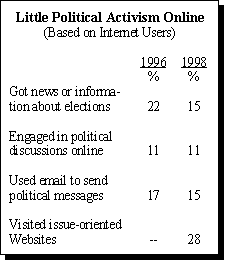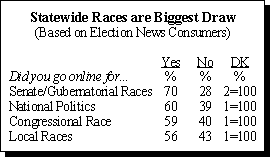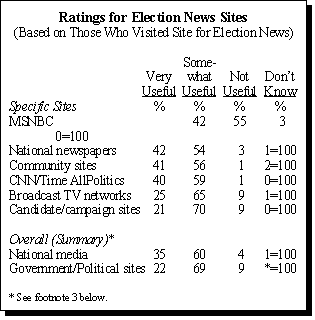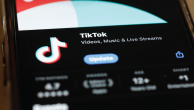During the 1998 campaign season, approximately 11 million Americans logged onto the Internet for news and information about the elections. This is an increase of four million people over 1996, bringing the total to 6% of the general population, up from 4% in 1996. These election news seekers are a particularly active group, using the Internet for a host of political activities beyond just information gathering.

But the news is not all good for those who see the Internet as a new forum for political information and discourse. While the number of Americans who went online for election news increased over the past two years, the percent of Internet users who logged on for information about campaigns or candidates actually fell to 15% in 1998 from 22% two years earlier. In part, this decrease may be due to the fact that 1996 was a presidential election year that attracted more national news coverage than this year’s midterm elections. Nonetheless, it’s striking that 85% of online users did not use the vast resources of the Internet for political news and information during campaign ’98.
Further, the online population has yet to embrace other forms of technology-based political expression. Just 28% of online users have visited a website that provides information about a specific issue or policy that interests them. Only 11% say they have ever engaged in online discussions about politics, unchanged from 1996. Fifteen percent have emailed groups or officials about political issues or public policy questions.
The broadening of the online audience has not increased the political relevance of the Internet. On the contrary, longtime Internet users are far more politically active than newcomers. For example, just 11% of those who came online within the last year turned to the Internet for election news, compared to 19% of longtime users; 7% of new users emailed a group or official compared to 21% of experienced users; and 7% engaged in online discussions about politics, compared to 14% of old hands.
Seeking Election News

When people did go online for election news in 1998, the big state races drew more attention than local elections. Fully 70% of those who went online for election news wanted information about senatorial or gubernatorial contests, compared to 56% who sought information on local races in their area.
Election news seekers were most likely to look for news about a candidate’s voting record (30%) and much less likely to pursue information about where and when to vote (12%). Fully 26% of this group registered their opinions by participating in an electronic poll. About one-in-five people who went online for election news sent or received email supporting or opposing a candidate (22%) or provided email or home mailing information about themselves (18%). A similar proportion (20%) downloaded or copied information about the elections. This percentage is down substantially from the 56% who copied information during the 1996 campaign. Only 13% participated in online discussions about the elections. This too represents a significant decline from 1996 when nearly one-third (31%) did so.
Among online election news consumers, men were more likely than women to look for information on a candidate’s voting record (35% vs. 23%) or download material (24% vs. 13%). Women were more interactive than men in their online behavior: 27% of women sent or received email regarding a candidate, compared to 19% of men.
Where do they turn?

When people went online for news about the 1998 elections, they went to the same place most voters go — the newsstand. When asked what type of website they used most often for news about the elections, fully 50% of online election news consumers said they logged onto a national news organization’s website. Some 29% turned to local news outlets most often. Commercial services were the first choice of 26% of the online election news audience, and state and local government websites were the top choice of 20%.
Sites that specialize specifically in politics were less popular — only 16% said this is where they went most often. Issue-oriented websites and candidate websites were relied upon by even fewer election news consumers (14% and 7%, respectively).
Election news consumers were asked whether they had visited several specific websites to get information about the 1998 elections. The most popular sites were those of the broadcast TV networks — ABC, NBC and CBS. Fully 26% say they went onto one or more of these sites. Next in line, each with 23%, were MSNBC, CNN/Time AllPolitics and the websites of national newspapers. Twenty-two percent visited a local or community website for election news.
These various websites earned mixed ratings from election news consumers in terms of their usefulness. Overall, media sites received higher ratings than government or campaign sites.1 More than one-third (35%) of those who used these sites rated the various national media sites as very useful, 22% said the same of the political sites included in the survey.

In terms of specific ratings, the first tier included MSNBC, the sites of national newspapers, sites devoted to local community news, and CNN/Time All Politics — all rated very useful by 40% or more of election news seekers. The second tier included the broadcast TV networks and the websites of candidates and campaigns, at 25% or less.
While people went online for election information because of a sense of duty, the information often had an impact on their voting decisions. A 57% majority of those who went online for election news said they did so because they view it as a duty to be informed. Just 29% said they did so because they enjoy politics. Even so, one-in-three people who went online for election information said that what they learned on the web influenced their vote (34%).




